新概念英语第二册课文(96课)
- 格式:pdf
- 大小:1.81 MB
- 文档页数:3
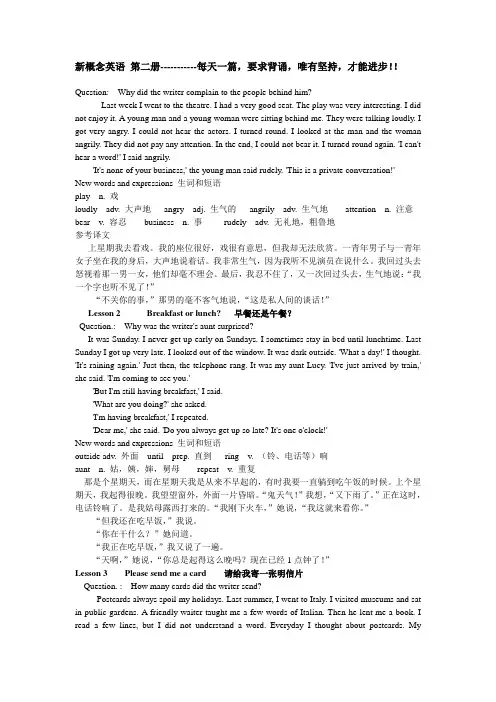
新概念英语第二册-----------每天一篇,要求背诵,唯有坚持,才能进步!!Question: Why did the writer complain to the people behind him?Last week I went to the theatre. I had a very good seat. The play was very interesting. I did not enjoy it. A young man and a young woman were sitting behind me. They were talking loudly. I got very angry. I could not hear the actors. I turned round. I looked at the man and the woman angrily. They did not pay any attention. In the end, I could not bear it. I turned round again. 'I can't hear a word!' I said angrily.'It's none of your business,' the young man said rudely. 'This is a private conversation!'New words and expressions 生词和短语play n. 戏loudly adv. 大声地angry adj. 生气的angrily adv. 生气地attention n. 注意bear v. 容忍business n. 事rudely adv. 无礼地,粗鲁地参考译文上星期我去看戏。
我的座位很好,戏很有意思,但我却无法欣赏。
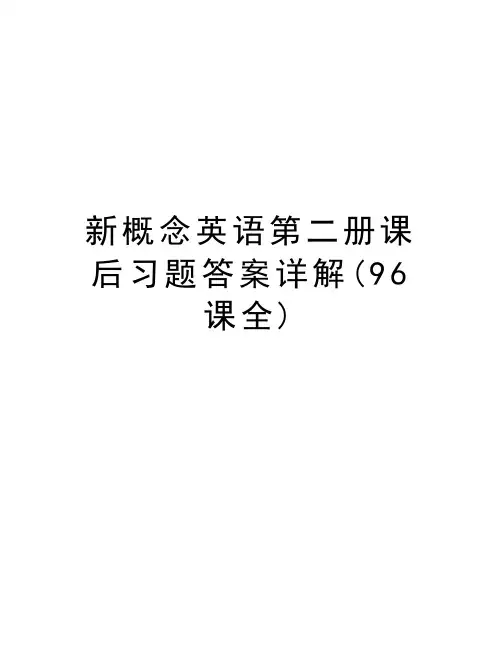
新概念英语第二册课后习题答案详解(96课全)新概念英语第二册课后习题答案详解Lesson 31. c根据课文可以判断出作者不喜欢写明信片,但他很想收到别人寄来的明信片,所以应该选c.d. doesn’t like postcards 不喜欢明信片,和课文的含义不符合,所以不选d.2. a根据课文最后两句话可以判断出:作者作出的“一项重大决定”是给他的朋友们写明信片,可是还是一张没有写成,所以应该选a.3. ca. at 表示在小的地点和空间;b. to 表示方向;d. on 表示在……上;只有c. in 表示在大的空间和地方,如城市国家等,所以选c.4. a只有选a. Who taught ,这句问话才与回答相配。
5. d只有选d. in a friendly way(以友好的方式)才能说明前一句He was a friendly waiter,也合乎语法和逻辑。
而其他3个 a. friend(朋友), b. as friends(作为朋友),c. like friends(像朋友一样)在语法上都讲不通。
6. b本句的时态是一般过去时,应该用动词的过去式形式;a. reads 是第3人称蛋单数现在时形式;c. red 词意思不符合;d. reading 是现在分词形式;b. read 过去式和现在式形式相同,发音不同。
所以只有选b.7. ca. the hole 词意思不对;b. the ball 和 d. all of 不合乎习惯用法;英语中不用the all day, all of day 这样一来的短语。
只有选c. all 才能使句中的词组all day 同前一句中的the whole day 意思相同。
8. c句中的waiter 是“饭店服务员”的意思,他通常在饭店工作,而不在a. public garden(公园),b. shop(商店),d. private house(私宅) 工作,所以选c. restaurant.9. b只有b. borrowed 才与前一句中的lent相对应,而其他3个选择都不是。
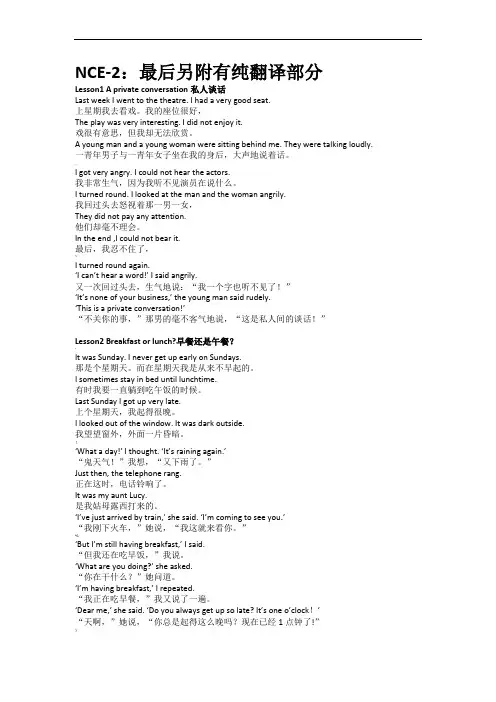
NCE-2:最后另附有纯翻译部分Lesson1 A private conversation私人谈话Last week I went to the theatre. I had a very good seat.上星期我去看戏。
我的座位很好,The play was very interesting. I did not enjoy it.戏很有意思,但我却无法欣赏。
A young man and a young woman were sitting behind me. They were talking loudly.一青年男子与一青年女子坐在我的身后,大声地说着话。
I got very angry. I could not hear the actors.我非常生气,因为我听不见演员在说什么。
I turned round. I looked at the man and the woman angrily.我回过头去怒视着那一男一女,They did not pay any attention.他们却毫不理会。
In the end ,I could not bear it.最后,我忍不住了,~I turned round again.‘I can’t hear a word!’ I said angrily.又一次回过头去,生气地说:“我一个字也听不见了!”‘It’s none of your business,’ the young man said rudely.‘This is a private conversation!’“不关你的事,”那男的毫不客气地说,“这是私人间的谈话!”Lesson2 Breakfast or lunch?早餐还是午餐?'It was Sunday. I never get up early on Sundays.那是个星期天。
而在星期天我是从来不早起的。
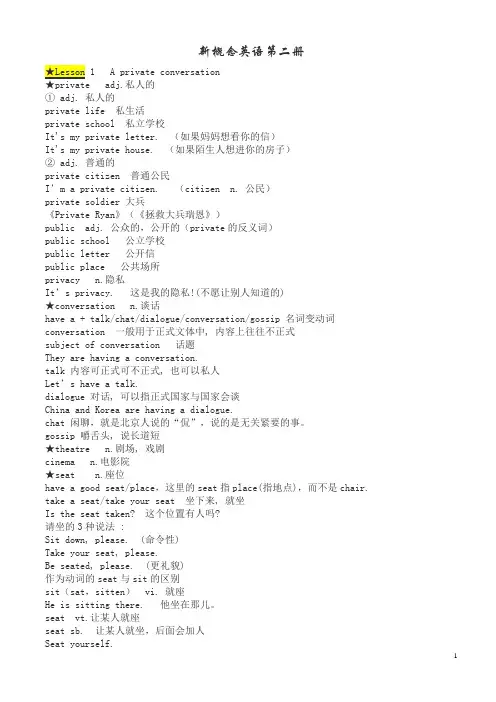
新概念英语第二册私人的① adj. 私人的private life 私生活private school 私立学校It's my private letter. (如果妈妈想看你的信)It's my private house. (如果陌生人想进你的房子)② adj. 普通的private citizen 普通公民I’m a private citizen. (citizen n. 公民)private soldier 大兵《Private Ryan》(《拯救大兵瑞恩》)public adj. 公众的,公开的(private的反义词)public school 公立学校public letter 公开信public place 公共场所privacy n.隐私It’s privacy. 这是我的隐私!(不愿让别人知道的)★conversation n.谈话have a + talk/chat/dialogue/conversation/gossip 名词变动词conversation 一般用于正式文体中, 内容上往往不正式subject of conversation 话题They are having a conversation.talk 内容可正式可不正式, 也可以私人Let’s have a talk.dialogue 对话, 可以指正式国家与国家会谈China and Korea are having a dialogue.chat 闲聊,就是北京人说的“侃”,说的是无关紧要的事。
gossip 嚼舌头, 说长道短★theatre n.剧场, 戏剧cinema n.电影院★seat n.座位have a good seat/place,这里的seat指place(指地点),而不是chair. take a seat/take your seat 坐下来, 就坐Is the seat taken? 这个位置有人吗?请坐的3种说法 :Sit down, please. (命令性)Take your seat, please.Be seated, please. (更礼貌)作为动词的seat与sit的区别sit(sat,sitten) vi. 就座He is sitting there. 他坐在那儿。
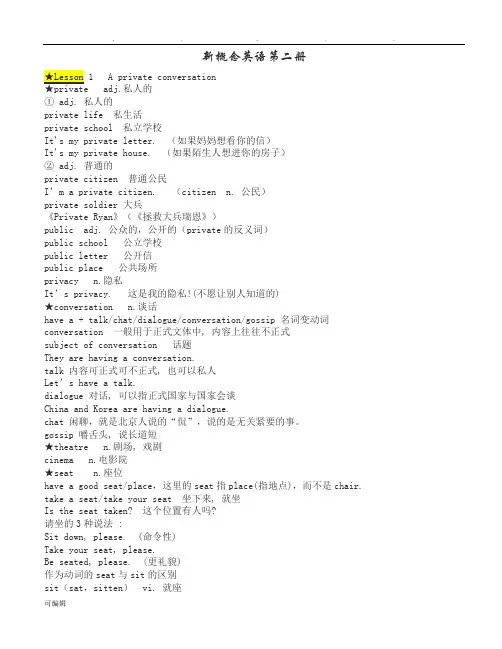
新概念英语第二册私人的① adj. 私人的private life 私生活private school 私立学校It's my private letter. (如果妈妈想看你的信)It's my private house. (如果陌生人想进你的房子)② adj. 普通的private citizen 普通公民I’m a private citizen. (citizen n. 公民)private soldier 大兵《Private Ryan》(《拯救大兵瑞恩》)public adj. 公众的,公开的(private的反义词)public school 公立学校public letter 公开信public place 公共场所privacy n.隐私It’s privacy. 这是我的隐私!(不愿让别人知道的)★conversation n.谈话have a + talk/chat/dialogue/conversation/gossip 名词变动词conversation 一般用于正式文体中, 内容上往往不正式subject of conversation 话题They are having a conversation.talk 内容可正式可不正式, 也可以私人Let’s have a talk.dialogue 对话, 可以指正式国家与国家会谈China and Korea are having a dialogue.chat 闲聊,就是北京人说的“侃”,说的是无关紧要的事。
gossip 嚼舌头, 说长道短★theatre n.剧场, 戏剧cinema n.电影院★seat n.座位have a good seat/place,这里的seat指place(指地点),而不是chair. take a seat/take your seat 坐下来, 就坐Is the seat taken? 这个位置有人吗?请坐的3种说法 :Sit down, please. (命令性)Take your seat, please.Be seated, please. (更礼貌)作为动词的seat与sit的区别sit(sat,sitten) vi. 就座He is sitting there. 他坐在那儿。
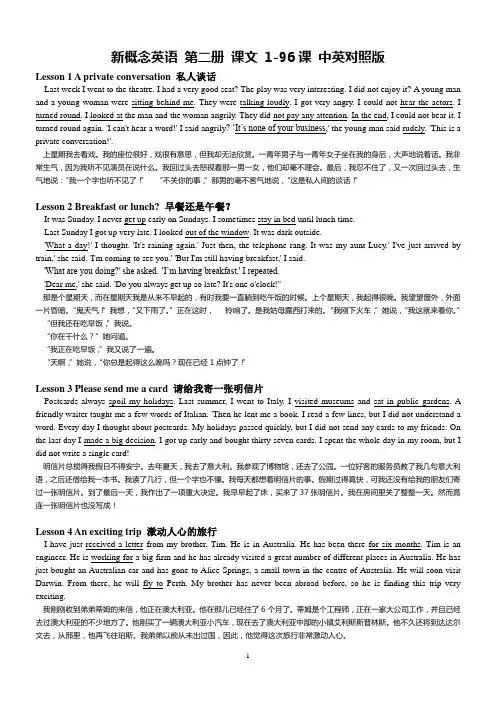
新概念英语第二册课文1-96课中英对照版Lesson 1 A private conversation 私人谈话Last week I went to the theatre. I had a very good seat? The play was very interesting. I did not enjoy it? A young man and a young woman were sitting behind me. They were talking loudly. I got very angry. I could not hear the actors. I turned round. I looked at the man and the woman angrily. They did not pay any attention. In the end, I could not bear it. I turned round again. 'I can't hear a word!' I said angrily? ‘It’s none of your business,' the young man said rudely. 'This is a private conversation!'.上星期我去看戏。
我的座位很好,戏很有意思,但我却无法欣赏。
一青年男子与一青年女子坐在我的身后,大声地说着话。
我非常生气,因为我听不见演员在说什么。
我回过头去怒视着那一男一女,他们却毫不理会。
最后,我忍不住了,又一次回过头去,生气地说:“我一个字也听不见了!”“不关你的事,”那男的毫不客气地说,“这是私人间的谈话!”Lesson 2 Breakfast or lunch? 早餐还是午餐?It was Sunday. I never get up early on Sundays. I sometimes stay in bed until lunch time.Last Sunday I got up very late. I looked out of the window. It was dark outside.'What a day!' I thought. 'It's raining again.' Just then, the telephone rang. It was my aunt Lucy.' I've just arrived by train,' she said. 'I'm coming to see you.' 'But I'm still having breakfast,' I said.'What are you doing?' she asked. ‘I’m having breakfast,' I repeated.'Dear me,' she said. 'Do you always get up so late? It's one o'clock!''那是个星期天,而在星期天我是从来不早起的,有时我要一直躺到吃午饭的时候。
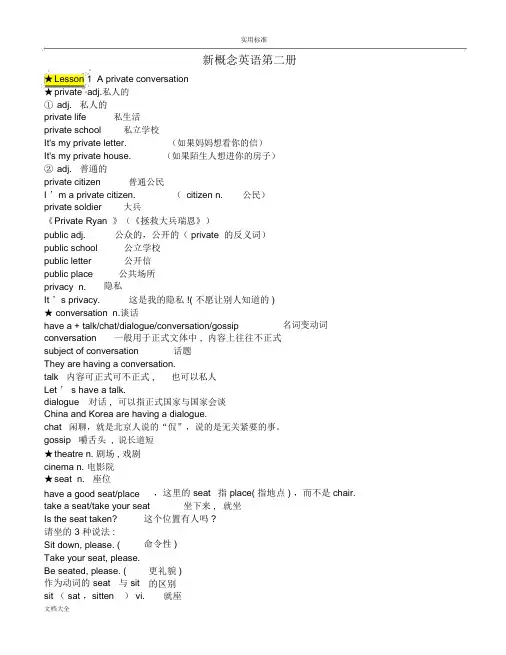
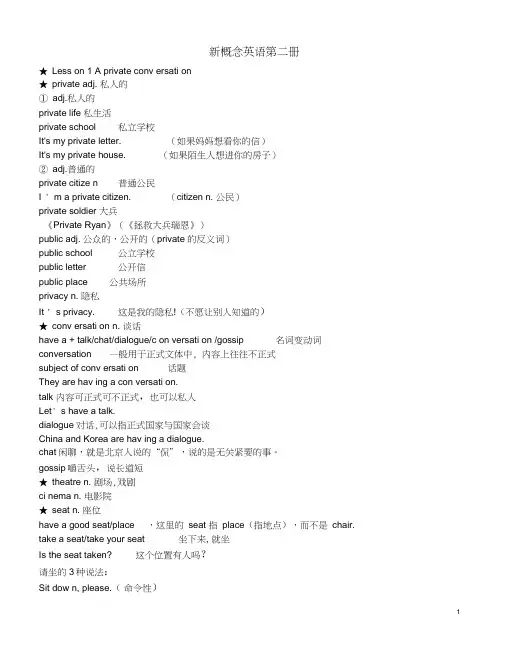
新概念英语第二册★Less on 1 A private conv ersati on★private adj. 私人的①adj.私人的private life 私生活private school 私立学校It's my private letter. (如果妈妈想看你的信)It's my private house. (如果陌生人想进你的房子)②adj.普通的private citize n 普通公民I ' m a private citizen. (citizen n. 公民)private soldier 大兵《Private Ryan》(《拯救大兵瑞恩》)public adj. 公众的,公开的(private 的反义词)public school 公立学校public letter 公开信public place 公共场所privacy n. 隐私It ' s privacy. 这是我的隐私!(不愿让别人知道的)★conv ersati on n. 谈话have a + talk/chat/dialogue/c on versati on /gossip 名词变动词conversation —般用于正式文体中,内容上往往不正式subject of conv ersati on 话题They are hav ing a con versati on.talk 内容可正式可不正式,也可以私人Let' s have a talk.dialogue对话,可以指正式国家与国家会谈China and Korea are hav ing a dialogue.chat闲聊,就是北京人说的“侃”,说的是无关紧要的事。
gossip嚼舌头,说长道短★theatre n. 剧场,戏剧ci nema n. 电影院★seat n. 座位have a good seat/place ,这里的seat 指place(指地点),而不是chair. take a seat/take your seat 坐下来, 就坐Is the seat taken? 这个位置有人吗?请坐的3种说法:Sit dow n, please.(命令性)Take your seat, please.Be seated, please.(更礼貌)作为动词的seat与sit的区别sit (sat,sitten )vi. 就座He is sitting there. 他坐在那儿。
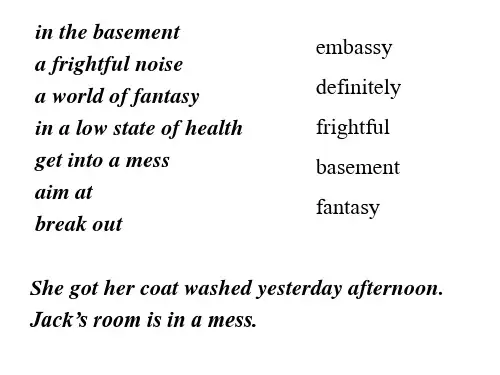
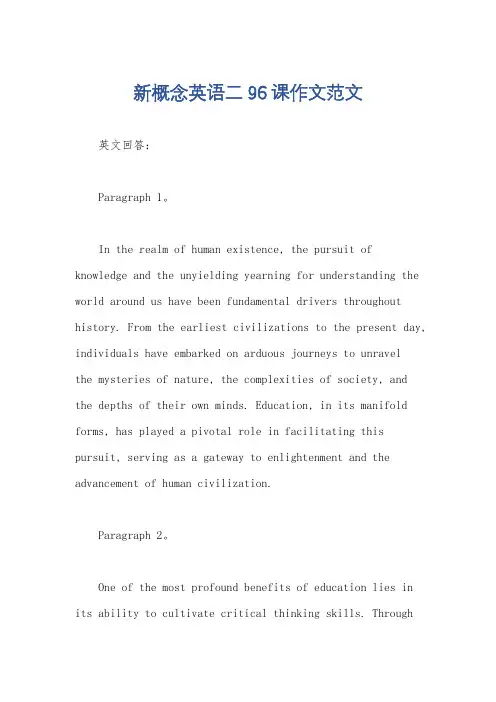
新概念英语二96课作文范文英文回答:Paragraph 1。
In the realm of human existence, the pursuit of knowledge and the unyielding yearning for understanding the world around us have been fundamental drivers throughout history. From the earliest civilizations to the present day, individuals have embarked on arduous journeys to unravelthe mysteries of nature, the complexities of society, and the depths of their own minds. Education, in its manifold forms, has played a pivotal role in facilitating this pursuit, serving as a gateway to enlightenment and the advancement of human civilization.Paragraph 2。
One of the most profound benefits of education lies in its ability to cultivate critical thinking skills. Throughrigorous academic inquiry, individuals are challenged to examine evidence, analyze arguments, and form independent judgments. This process of intellectual exploration not only enhances problem-solving abilities but also fosters a spirit of curiosity and a lifelong thirst for knowledge. An educated mind becomes adept at discerning truth from falsehood, distinguishing fact from opinion, and navigating the complexities of the modern world with a discerning eye.Paragraph 3。
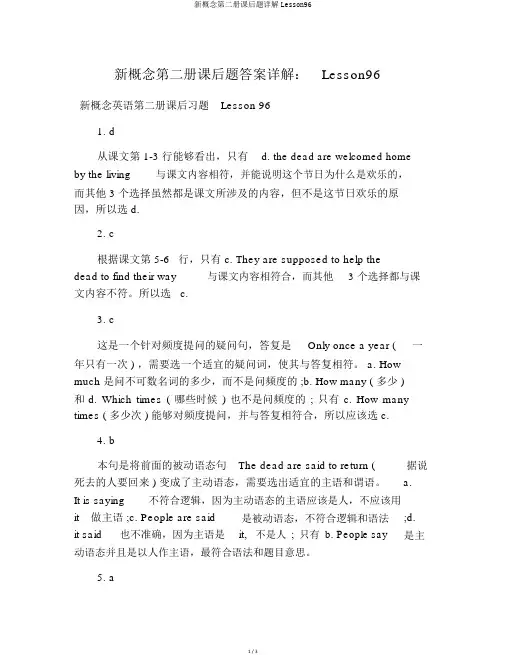
新概念第二册课后题答案详解:Lesson96新概念英语第二册课后习题 Lesson 961. d从课文第 1-3 行能够看出,只有d. the dead are welcomed homeby the living与课文内容相符,并能说明这个节日为什么是欢乐的,而其他 3 个选择虽然都是课文所涉及的内容,但不是这节日欢乐的原因,所以选 d.2. c根据课文第 5-6 dead to find their way 行,只有 c. They are supposed to help the与课文内容相符合,而其他3 个选择都与课文内容不符。
所以选 c.3. c这是一个针对频度提问的疑问句,答复是Only once a year (一年只有一次 ) ,需要选一个适宜的疑问词,使其与答复相符。
a. Howmuch 是问不可数名词的多少,而不是问频度的 ;b. How many ( 多少 )和 d. Which times ( 哪些时候 ) 也不是问频度的 ; 只有 c. How many times ( 多少次 ) 能够对频度提问,并与答复相符合,所以应该选 c.4. b本句是将前面的被动语态句 The dead are said to return (据说死去的人要回来 ) 变成了主动语态,需要选出适宜的主语和谓语。
a.It is saying 不符合逻辑,因为主动语态的主语应该是人,不应该用it 做主语 ;c. People are saidit said也不准确,因为主语是是被动语态,不符合逻辑和语法it, 不是人 ; 只有 b. People say;d.是主动语态并且是以人作主语,最符合语法和题目意思。
5. a本句需要一个同前一句的时间状语All night long( 整个夜晚) 含义相同的短语,才能使两个句子意义相同。
b. in all the night 不符合习惯用法,应将介词in 去掉才准确;c. the night long 不是准确的表达方式,意义不通顺;d. in the night 不符合语法,应该是at night;只有 a. during the whole night(整个夜晚) 既符合语法也符合题目意思,所以选 a.6. d这是一个含有if引导的条件从句的句子,主句用的是一般将来时,If 从句应该用一般现在时才符合语法规那么。
新概念频道为⼤家整理的新概念英语第⼆册课⽂及翻译91到96 ,供⼤家参考。
更多阅读请查看本站频道。
Lesson91 Three men in a basket 三⼈同篮A pilot noticed a balloon which seemed to be making for a Royal Air Force Station nearby. He informed the station at once, but no one there was able to explain the mystery. The officer in the control tower was very angry when he heard the news, because balloons can be a great danger to aircraft. He said that someone might by spying on the station and the pilot was ordered to keep track of the strange object. The pilot managed to circle the balloon for some time. He could make out three men in a basket under it and one of them was holding field-glasses. When the balloon was over the station, the pilot saw one of the men taking photographs. Soon afterwards, the balloon began to descend and it landed near an airfield. The police were called in, but they could not arrest anyone, for the basket contained two Members of Parliament and the Commanding Officer of the station! As the Commanding Officer explained later, one half of the station did not know what the other half was doing !⼀个飞⾏员发现了⼀只⽓球,它像是正飞往附近的⼀个皇家空军基地。
新概念二96课背诵表以下是新概念英语第二册96课的背诵表,它包含了本课的重要词汇、短语和句子,帮助你更好地学习和掌握课程内容。
一、重要词汇1.across - 横过;穿越;遍及2.continent - 大陆;洲3.vast - 巨大的;辽阔的4.territory - 领土;版图5.mountainous - 多山的6.fertile - 肥沃的;富饶的7.plain - 平原8.coast - 海岸9.climate - 气候d - 温和的;温暖的二、重要短语1.on the other side of - 在...的另一边2.be known as - 被称为3.be famous for - 以...闻名4.have a population of - 拥有人口5.in contrast to - 与...形成对比6.all the year round - 一年到头三、重要句子1.It is an illusion to suppose that you can make up for a whole year of wasted time.认为你能弥补一整年浪费的时间是一种错觉。
2.An interesting question therefore remains as to how far Microsoft can go with Gates as its CEO.因此,一个有趣的问题仍然存在:微软在盖茨担任首席执行官的情况下能走多远?3.There is no doubt that in the future, as the pace of technology accelerates, we will see an even greater demand for talented individuals who can keep up with this rapid pace of change.毫无疑问,在未来,随着技术步伐的加快,我们将看到对能够跟上这种快速变化步伐的人才的需求会更大。
新概念英语第二册A private conversation★private adj.私人的①adj. 私人的private life 私生活private school 私立学校It's my private letter. (如果妈妈想看你的信)It's my private house. (如果陌生人想进你的房子)②adj. 普通的private citizen 普通公民I’m a private citizen. (citizen n. 公民)private soldier 大兵《Private Ryan》(《拯救大兵瑞恩》)public adj. 公众的,公开的(private的反义词)public school 公立学校public letter 公开信public place 公共场所privacy n.隐私It’s privacy. 这是我的隐私!(不愿让别人知道的)★conversation n.谈话have a + talk/chat/dialogue/conversation/gossip 名词变动词conversation 一般用于正式文体中, 内容上往往不正式subject of conversation 话题They are having a conversation.talk 内容可正式可不正式, 也可以私人Let’s have a talk.dialogue 对话, 可以指正式国家与国家会谈China and Korea are having a dialogue.chat 闲聊,就是北京人说的“侃”,说的是无关紧要的事。
gossip 嚼舌头, 说长道短★theatre n.剧场, 戏剧cinema n.电影院★seat n.座位have a good seat/place,这里的seat指place(指地点),而不是chair. take a seat/take your seat 坐下来, 就坐Is the seat taken? 这个位置有人吗?请坐的3种说法:Sit down, please. (命令性)Take your seat, please.Be seated, please. (更礼貌)作为动词的seat与sit的区别sit(sat,sitten)vi. 就座He is sitting there. 他坐在那儿。
NCE-2:最后另附有纯翻译部分Lesson1 A private conversation私人谈话Last week I went to the theatre. I had a very good seat.上星期我去看戏。
我的座位很好,The play was very interesting. I did not enjoy it.戏很有意思,但我却无法欣赏。
A young man and a young woman were sitting behind me. They were talking loudly.一青年男子与一青年女子坐在我的身后,大声地说着话。
I got very angry. I could not hear the actors.我非常生气,因为我听不见演员在说什么。
I turned round. I looked at the man and the woman angrily.我回过头去怒视着那一男一女,They did not pay any attention.他们却毫不理会。
In the end ,I could not bear it.最后,我忍不住了,I turned round again.‘I can’t hear a word!’ I said angrily.又一次回过头去,生气地说:“我一个字也听不见了!”‘It’s none of your business,’ the young man said rudely.‘This is a private conversation!’“不关你的事,”那男的毫不客气地说,“这是私人间的谈话!”Lesson2 Breakfast or lunch?早餐还是午餐?It was Sunday. I never get up early on Sundays.那是个星期天。
而在星期天我是从来不早起的。
I sometimes stay in bed until lunchtime.有时我要一直躺到吃午饭的时候。
新概念英语第二册★Lesson 1 A private conversation★private adj.私人的① adj. 私人的private life 私生活private school 私立学校It's my private letter. (如果妈妈想看你的信)It's my private house. (如果陌生人想进你的房子)② adj. 普通的private citizen 普通公民I’m a private citizen.(citizen n. 公民)private soldier 大兵《Private Ryan》(《拯救大兵瑞恩》)public adj. 公众的,公开的(private的反义词)public school 公立学校public letter 公开信public place 公共场所privacy n.隐私It’s privacy. 这是我的隐私!(不愿让别人知道的)★conversation n.谈话have a + talk/chat/dialogue/conversation/gossip 名词变动词conversation 一般用于正式文体中, 内容上往往不正式subject of conversation 话题They are having a conversation.talk 内容可正式可不正式, 也可以私人Let’s have a talk.dialogue 对话, 可以指正式国家与国家会谈China and Korea are having a dialogue.chat 闲聊,就是北京人说的“侃”,说的是无关紧要的事。
gossip 嚼舌头, 说长道短★theatre n.剧场, 戏剧cinema n.电影院★seat n.座位have a good seat/place,这里的seat指place(指地点),而不是chair. take a seat/take your seat 坐下来, 就坐Is the seat taken? 这个位置有人吗?请坐的3种说法:Sit down, please. (命令性)Take your seat, please.Be seated, please. (更礼貌)作为动词的seat与sit的区别sit(sat,sitten)vi. 就座He is sitting there. 他坐在那儿。